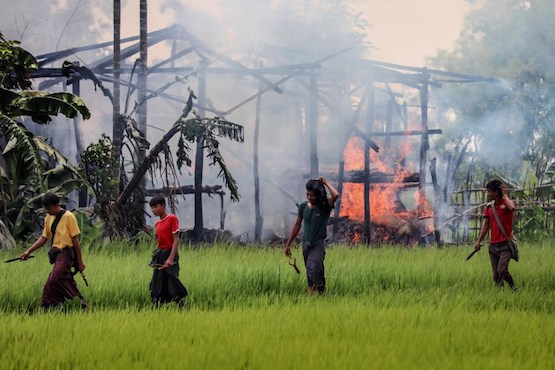Pro-Hindu party claims persecuted minority is aiding the Islamic militants in conflict-torn Jammu and Kashmir

A Rohingya refugee carries her son outside their shanty house in the Gandhi Nagar area of Jammu, India. Pro-Hindu groups often accuse Rohingya Muslims of supporting Islamic militants from Pakistan. (Photo by Umer Asif/ucanews.com)
February 19, 2018
India’s pro-Hindu party is again demanding that Rohingya refugees, many of whom fled alleged military attacks in Myanmar, be deported from the northern state of Jammu and Kashmir.
It has accused the persecuted ethnic group of sheltering Islamic militants in the insurgency-wrecked state that borders Pakistan.
The Bharatiya Janata Party (BJP) has been stepping up its calls to forcibly remove them from the restive area since Feb. 10.
The trigger was a suicide attack on an army training camp in Jammu launched by three militants from Pakistan-based outfit Jaish-e-Mohammad.
In the ensuing 48-hour gun battle, 10 people were killed including six army personnel, one civilian and the three insurgents.
The pro-Hindu party, part of the ruling coalition in the Muslim-majority state, has accused Rohingya Muslims of providing cover for the Pakistan-based militants as part of an ongoing Islamic struggle to wrest the region from India’s control.
The state houses 1,219 Rohingya families comprising a total of 5,107 people, according to official records.
Most live in makeshift shanties on roadsides and eke out a living as daily laborers or collecting scrap.

In this Sept. 7, 2017 file photo, unidentified men carry knives and slingshots as they walk past a burning house in Gawdu Tharya village near Maungdaw in Rakhine state in northern Myanmar. Aerial photos of Rohingya villages in Myanmar have emerged showing apparently bulldozed land with no recognizable signs of habitation, as activists say there are growing fears that the Muslim minority will lose not only their homes but their history. (Photo by AFP)
Hundreds of thousands of Muslim Rohingya fled their native Rakhine State following violence and discriminatory treatment in the Buddhist-majority country.
The Myanmar government refuses to accept them as natives and considers them migrants from Bangladesh, where they also face discrimination.
The BJP has adopted a similarly unwelcoming position.
Rohingya Muslims are a “threat to security” in Jammu and Kashmir, said Kulvinder Gupta, a senior party leader and speaker of the legislative house.
“There are complaints about them. In a way the government has also accepted that the number of Rohingya and Bangladeshis is increasing, and that they pose a security threat,” he said.
Another BJP leader, Ravinder Raina, said it is high time the government deported them.
“There have been warnings from intelligence agencies that Rohingya could potentially be exploited by terror groups in Pakistan. We demand their immediate deportation,” he told the media recently.
In the wake of such statements local media have also reported stories about masked men on motorcycles threatening the refugees in Jammu.
An Urdu-language daily reported that kerosene was poured on the shanties as unidentified groups sought to burn them out on the night of Feb. 12.

An Indian supporter of the Bharatiya Janata Party (BJP) wears a mask with Indian Prime Minister Narendra Modi’s picture on it while gesturing as Modi speaks during a public rally ahead of state legislative assembly election in Tripura on Feb. 8. The BJP believes the Rohingya are harboring terrorists in Jammu and Kashmir. (Photo by Arindam Dey/AFP)
Several Muslim organizations have expressed concern over the treatment of the Rohingya, some of whom have already battled horrendous conditions in refugee camps in Bangladesh and elsewhere.
Local political leader Sheikh Abdul Rashid told ucanews.com the Rohingya Muslims have already faced extreme hardship and squalor and should not be linked to the terror organization before proof is found.
“They even lack water and sanitation facilities,” he said, speaking of the dire conditions at the camps.
The government may want to remove them from the state but that does not make it all right to adopt a blanket policy of “assassinating the character of the refugees,” Rashid said.
Muhammad Yasin Khan of the Kashmir Economic Alliance (KEA), a conglomerate of various business organizations, called it a “witch hunt” and “conspiracy” against Muslims, which he said suits the BJP’s overarching agenda of fostering a Hindu nation.
Sujaa Ahmad, a social worker who helps to educate Rohingya children, said the threats and intimidation by hard-line Hindu groups have already compelled hundreds to flee the state.
“These people could be anything except terrorist sympathizers,” Ahmad said.
“They know first-hand what it means to be homeless, so why would they jeopardize what they have here by something that could endanger their own lives?” he asked.
Peace continues to elude the strife-torn Kashmir Valley on the India-Pakistan border, with sectarian violence escalating in the Muslim-dominated region.
Recent figures show that 450 people were killed in the Indian part of Kashmir in 2017 in an upward trend in incidents of intermittent bloodshed, curfews and killings.
The India-Pakistan dispute over the Muslim-dominated Kashmir Valley began soon after British-ruled India was divided in 1947 based on religion to create the two nations. Both nations now administer Kashmir as militants continue their struggle to end Indian rule in India-administered Kashmir, allegedly aided by Pakistan.
